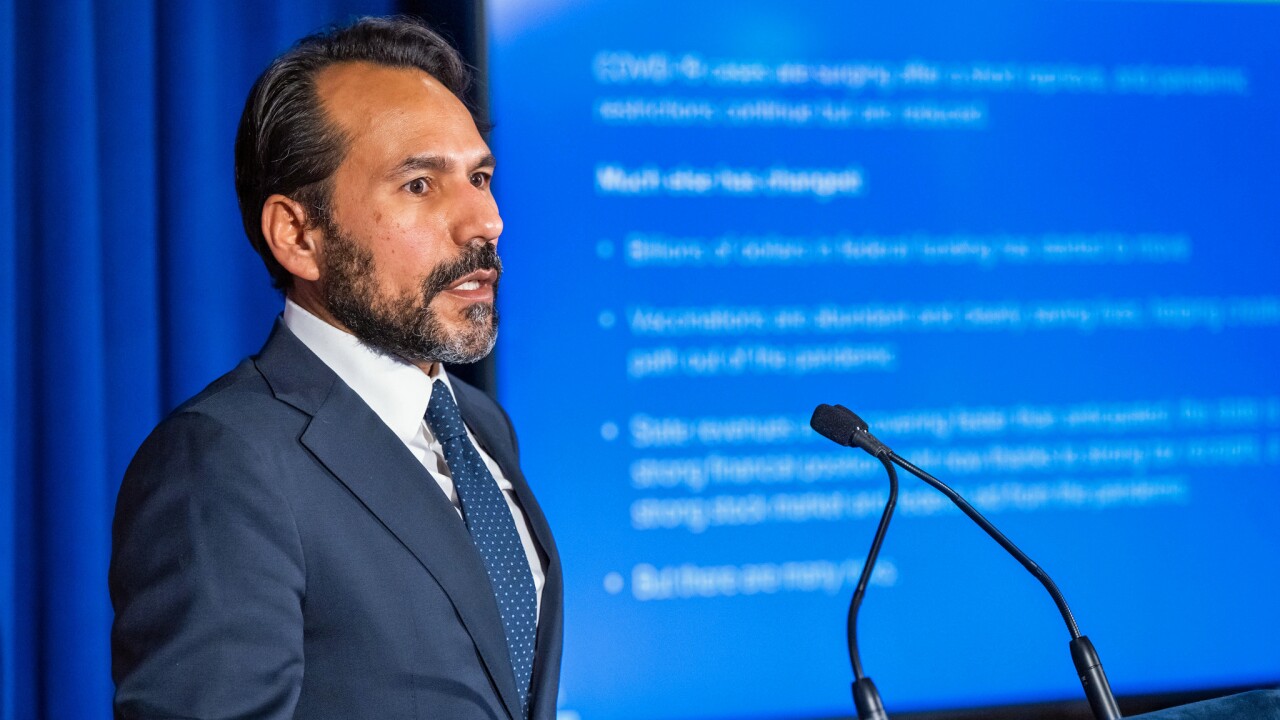Standard & Poor's Ratings Services said it has lowered its general obligation (GO) rating on the commonwealth of Puerto Rico to CCC-plus from B.
At the same time, Standard & Poor's has placed the GO rating on CreditWatch with negative implications.
In addition, Standard & Poor's has lowered its ratings on: Puerto Rico Sales Tax Financing Corp.'s (COFINA) first-lien sales tax bonds to CCC-plus from B and COFINA's second-lien sales tax bonds to CCC-plus from B; Puerto Rico Municipal Finance Agency's, the Puerto Rico Employees Retirement System's, and the commonwealth's general fund-supported appropriation and moral obligation bonds to CCC-plus from B; Puerto Rico Infrastructure Financing Authority's (rum tax) and the Puerto Rico Convention Center District Authority's (hotel tax) debt to CCC-plus from B; and Puerto Rico Highway and Transportation Authority's rated debt (HTA) to CCC-plus from B.
These bonds have also been placed on CreditWatch with negative implications.
It based the downgrade of Puerto Rico's tax-supported debt on its view that the commonwealth's market access prospects have further weakened and Puerto Rico's ability to meet its financial commitments is increasingly tied to the business, financial, and economic conditions on the island. Absent improvement in those conditions, debt and other financial commitments will be unsustainable.
Placement of the ratings on CreditWatch negative reflects the commonwealth's current lack of consensus on key elements of the fiscal 2016 budget could exacerbate liquidity and fiscal pressure. It expects to resolve the CreditWatch within three months when enactment of a budget will provide additional information allowing it to evaluate overall liquidity.
Enactment of a credible balanced budget by the start of the new fiscal year (July 1) could be an important element in Puerto Rico regaining external market access. Should passage of a fiscal 2016 budget become significantly delayed, or the budget is enacted with significant structural flaws, it could lower the rating to CCC or lower. Alternatively, if timely budget adoption translates into stabilized liquidity, it could remove the ratings from CreditWatch and affirm the CCC-plus ratings.
Recent developments highlight liquidity risk for the commonwealth from diminished external market access. The board of the Puerto Rico Government Development Bank (GDB) recently sent a letter to the governor and state legislators indicating increasingly remote prospects for selling a proposed refinancing of a $2.2 billion Highway and Transportation Authority loan from GDB with a larger $2.95 billion external bond issue backed by petroleum taxes. The purpose of the refinancing would be to improve GDB liquidity.
The GDB board cited liquidity problems that could occur as early as the start of fiscal 2016 unless legislators enact a budget and address tax reform. The existence of such a letter indicates liquidity stress.
It is unclear how the GDB's efforts to attract a nontraditional base of debt investors for the $2.95 billion external bond issue are affecting the commonwealth's budget and fiscal policy negotiations.
Even if the proposed value-added tax (VAT) were enacted by the legislature without delay, without external financing, liquidity may still fall below thresholds necessary to maintain operations and fund financial commitments. Further underscoring liquidity pressure is legislation introduced April 8 (P. de la C. 2406), which includes new restrictions on depositors in order to preserve GDB liquidity.
Introduction of the executive budget proposal for fiscal 2016 has been delayed as the legislature debates the administration's proposal to implement a new 16% VAT, whose level may be reduced after legislative deliberations. Imposition of a new VAT is subject to implementation risks, whose uncertainties might affect future budget performance and the willingness of investors to extend future credit, and which is incorporated into the CreditWatch designation.
Budget pressures are exacerbated by current weak economic trends and high debt levels, factors likely to persist in the long term. Imposition of a large VAT may increase overall tax revenue, but have negative short-term economic implications.
As a result of increasingly constrained capital market access, S&P has used an override factor within its state rating methodology to limit its GO rating on Puerto Rico to CCC-plus. It is now using its CCC criteria, which provides clarity for assigning ratings within the CCC and CC categories.
Under the CCC criteria, the degree of financial stress and the time frame for anticipated default are primary factors in the assessment of issuers rated within the CCC and CC categories. Although passage of a structurally balanced budget by July 1 may improve the odds of accessing the private debt markets to improve liquidity, substantial doubt exists as to whether an external debt sale of sufficient size may be accomplished by the end of fiscal 2015, or later in fiscal 2016, when substantial seasonal cash flow financing will be needed.
At present, Puerto Rico has very limited or no external debt market access in either the public or private external debt markets, including investment from private high-risk investors who have provided cash flow financing during the current fiscal year. The downgrade reflects the criteria override assessment of increased capital market access risk, combined with near-term liquidity pressures. Tis could lead to a government shutdown without access to external debt markets.
Although HTA, COFINA, rum, and hotel tax-secured debt appear to have adequate pledged revenues on a strict legal coverage basis, the rating agency is concerned that these revenue streams may not be adequately separated from the commonwealth's credit quality in the event of severe general fund credit or liquidity stress caused by the lack of debt market access.





